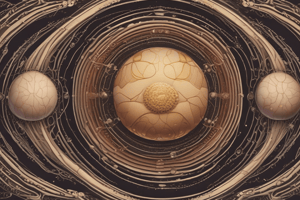Podcast
Questions and Answers
What is the primary characteristic of the Germinal Stage in prenatal development?
What is the primary characteristic of the Germinal Stage in prenatal development?
- Formation of major organs
- Rapid growth of the fetus
- Fertilization and formation of the zygote (correct)
- Differentiation of genitals
During which stage of prenatal development does the heart begin to beat?
During which stage of prenatal development does the heart begin to beat?
- Germinal Stage
- Neonatal Stage
- Embryonic Stage (correct)
- Fetal Stage
Which factor is considered a genetic factor influencing prenatal development?
Which factor is considered a genetic factor influencing prenatal development?
- Maternal nutritional status
- Psychosocial stress
- Chromosomal abnormalities (correct)
- Exposure to pollutants
What develops into the brain and spinal cord during the embryonic stage?
What develops into the brain and spinal cord during the embryonic stage?
What significant development occurs around week 12 of fetal development?
What significant development occurs around week 12 of fetal development?
Which psychosocial factor can significantly impact fetal development?
Which psychosocial factor can significantly impact fetal development?
What is a common prenatal assessment used to monitor fetal growth?
What is a common prenatal assessment used to monitor fetal growth?
Which of the following lifestyle choices can negatively affect prenatal development?
Which of the following lifestyle choices can negatively affect prenatal development?
Which aspect of maternal health could contribute to negative birth outcomes?
Which aspect of maternal health could contribute to negative birth outcomes?
During the fetal stage, which development is notably characterized by practice breathing movements?
During the fetal stage, which development is notably characterized by practice breathing movements?
Flashcards are hidden until you start studying
Study Notes
Prenatal Development
-
Definition: The period of development from fertilization to birth, typically lasting about 40 weeks.
-
Stages:
-
Germinal Stage (Weeks 1-2):
- Begins with fertilization.
- Formation of the zygote, which divides and forms a blastocyst.
- Implantation into the uterine wall.
-
Embryonic Stage (Weeks 3-8):
- Major organs and systems begin to develop.
- Key structures formed:
- Neural tube (develops into the brain and spinal cord).
- Heart starts beating.
- Formation of limbs, eyes, ears, and other organs.
- High susceptibility to teratogens (substances causing developmental anomalies).
-
Fetal Stage (Weeks 9-40):
- Rapid growth and maturation of structures formed in the embryonic stage.
- Development of features:
- Genitals differentiate (around week 12).
- Fetal movement (around weeks 16-20).
- Lung development and practice breathing movements.
- Brain development continues extensively.
-
-
Factors Influencing Prenatal Development:
- Genetic Factors: Chromosomal abnormalities can lead to conditions such as Down syndrome.
- Environmental Factors:
- Nutritional status of the mother (e.g., folic acid importance).
- Exposure to toxins (e.g., alcohol, drugs, pollutants).
- Maternal health conditions (e.g., diabetes, infections).
- Psychosocial Factors: Stress levels, socioeconomic status, and support systems can impact fetal development.
-
Assessment of Prenatal Health:
- Routine ultrasounds to monitor growth and development.
- Genetic screening tests (e.g., amniocentesis, chorionic villus sampling).
- Maternal health assessments (e.g., blood pressure, nutrition).
-
Factors Affecting Birth Outcomes:
- Maternal age (younger and older mothers at higher risk).
- Birth spacing and prenatal care.
- Lifestyle choices (e.g., smoking, alcohol consumption).
-
Critical Periods:
- Certain periods during prenatal development are critical for the formation of specific organs and systems, highlighting the importance of prenatal care.
-
Key Concepts:
- Teratogens: Agents that can cause malformations during embryonic or fetal development.
- Fetal Programming: The idea that environmental factors during prenatal development can influence long-term health outcomes.
Definition and Duration
- Prenatal development encompasses the time from fertilization to birth, generally lasting around 40 weeks.
Stages of Prenatal Development
-
Germinal Stage (Weeks 1-2):
- Starts with fertilization leading to zygote formation.
- The zygote divides to form a blastocyst, which implants into the uterine wall.
-
Embryonic Stage (Weeks 3-8):
- Critical development of major organs and systems occurs.
- Formation of the neural tube, which becomes the brain and spinal cord.
- The heart initiates beating and limbs, eyes, and ears begin to develop.
- High vulnerability to teratogens, substances that can cause developmental issues.
-
Fetal Stage (Weeks 9-40):
- Marked by rapid growth and maturation of previously formed structures.
- Genitals differentiate around week 12.
- Fetal movement becomes detectable between weeks 16-20.
- Lung development includes practicing breathing movements.
- Extensive brain development continues throughout this stage.
Influences on Prenatal Development
-
Genetic Factors:
- Chromosomal abnormalities may result in conditions like Down syndrome.
-
Environmental Factors:
- Maternal nutrition is crucial; folic acid is particularly important for development.
- Toxins such as alcohol, drugs, and pollutants can harm fetal development.
- Maternal health issues, including diabetes and infections, can affect outcomes.
-
Psychosocial Factors:
- Maternal stress, socioeconomic status, and support systems impact fetal health.
Assessment of Prenatal Health
- Routine ultrasounds are utilized for monitoring fetal growth and development.
- Genetic screening tests, such as amniocentesis and chorionic villus sampling, assess risks for abnormalities.
- Maternal health is evaluated through checks on blood pressure and nutritional status.
Factors Affecting Birth Outcomes
- Maternal age is a critical consideration, with younger and older mothers facing higher risks.
- Birth spacing and the level of prenatal care contribute to outcomes.
- Lifestyle choices, including smoking and alcohol intake, significantly impact fetal health.
Critical Periods and Key Concepts
- Certain periods during development are crucial for organ and system formation, underscoring the necessity for effective prenatal care.
- Teratogens: Agents that can induce malformations during development stages.
- Fetal Programming: The concept that prenatal environmental factors can influence lifelong health outcomes.
Studying That Suits You
Use AI to generate personalized quizzes and flashcards to suit your learning preferences.




